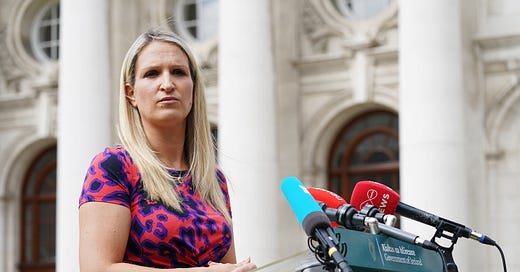Guilty Until Proven Innocent in Ireland
A new bill on ‘hate offenses’ is as draconian as it is ineffective.
Lawmakers in Ireland are set to pass a bill in the coming weeks that would criminalize “incitement…to hatred against a person” on account of his or her race, gender, or other protected characteristic. Despite outcry from civil-liberties activists, the bill sailed through the lower house of Irish Parliament and has been sent to the Senate for debate. With its expected passage, Ireland will boast one of the most—if not the most—far-reaching “hate speech” laws in Europe. Convicted offenders face a maximum of five years in jail for actions “likely to incite violence or hatred” and two years simply for “possessing materials likely to incite violence or hatred.”
Helen McEntee, the lawmaker behind the bill, justified the new restrictions by saying that “we all have the right to feel safe.” At first glance, a law criminalizing “hate speech” may seem hard-to-argue-with; any reasonable person would want to support marginalized people and condemn racists and sexists.
Eradicating prejudice, however, is not that simple. Hate speech legislation has, at best, a checkered track record: because hate speech laws are necessarily vague, they are frequently used against the minorities they are intended to protect.
Consider, for example, the arrest of five LGBT activists participating in the 2017 Glasgow Pride event for “breaching the peace with homophobic aggravation” after police found them holding a placard that read “these faggots fight fascists.” Or look at French police issuing $14,500 in fines against twelve individuals who wore “Boycott Israel” shirts and handed out pro-Palestinian pamphlets on the grounds they “provoke[d] discrimination.” Or remember the time Canadian customs agents seized 1,500 copies of a book by black feminist author bell hooks claiming that it violated the country’s hate speech laws.
As Nadine Strossen, long-time president of the ACLU, writes, “This pattern [of misapplication] is not a result of occasional ‘abuses’ of the laws, but rather is the inevitable, systematic result of any use of such laws, given their irreducible vagueness.” Using alleged bias or “hate” as the basis for conviction compels the government to look not just at actions but, more fundamentally, at a person’s mindset and ideology—a fraught endeavor admitting of wide differences of opinion.
But even with the defects of hate speech laws becoming widely apparent, Ireland is committing to a significant intensification of the nation’s already-existing hate speech legislation. What’s worse, the bill introduces two terribly concerning provisions that extend far beyond hate speech laws in other countries.
First, in an ill-conceived section on “preparing or possessing material likely to incite violence or hatred,” the bill shifts the burden of proof to the accused. If the government accuses a person of possessing “hateful” material, it is up to that person to prove that he or she did not intend to distribute it to “incite” hatred. This seems all but impossible to contest in many cases. If the government charges a person for having a “hateful” meme saved in his phone, how could a person possibly prove it was meant for their eyes only—even if it was?
Second, the law, in multiple sections, specifies that “being reckless” is sufficient grounds for conviction. “Reckless,” in a legal sense, means that a person “consciously disregards a substantial and unjustified risk.” For example, drunk driving is reckless behavior. A person engaging in reckless behavior need not intend a bad outcome, but nonetheless proceeds with an action that substantially risks that outcome.
This emphasis on “recklessness” is a major deviation from the widely-accepted standard of the United Nations’ International Covenant on Civil and Political Rights, which provides that only advocacy of “hatred” may be “prohibited by law.” Moreover, a 2012 UN report stipulates that this advocacy must be “explicit, intentional, public and active support and promotion of hatred towards the target group.”
That Irish lawmakers included recklessness as sufficient grounds for conviction in a hate speech law has frightening implications. What would “being reckless” look like? Would a comedian who makes a stereotypical joke about a minority group be acting recklessly? How about a preacher who says marriage ought to be between a man and a woman? What about an elderly person who comments about how difficult certain foreign names are to pronounce?
Any one of these examples could potentially be deemed “reckless” by a judge or jury. Such a vague and overbroad law poses a serious threat to free expression, since a reasonable person will be unable to distinguish between permissible and impermissible speech.
The failure of hate speech laws at promoting equality boils down to this: While punishment may provide a sense of justice for the victim, it does not address the underlying biases that led to the offense in the first place. Lawmakers should follow facts and reason not the urge to virtue signal. Laws criminalizing hate speech not only fail minorities, they mislead them by providing a false sense of security. If Irish lawmakers want to reduce prejudice, they should abandon this bill and instead promote education. Fostering unity reduces prejudice, not imprisoning your enemies.
Natalie Alkiviadou is a senior research fellow at the Future of Free Speech Project (Copenhagen - Nashville)
Jeff Cieslikowski is a research associate at the Foundation for Individual Rights and Expression (FIRE) in Washington, DC.
Follow Persuasion on Twitter, LinkedIn, and YouTube to keep up with our latest articles, podcasts, and events, as well as updates from excellent writers across our network.
And, to receive pieces like this in your inbox and support our work, subscribe below:







I don’t want to sound cynical, but any law that curbs free speech will be used to promote established majority opinions against minority opinions. After all wasn’t the notion that the earth revolves around the sun hateful to the Church?
Completely appalling law, entirely incompatible with a free society. Sad day for Ireland if this passes.